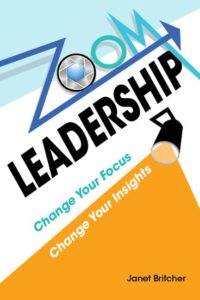Leadership Workshops
Leadership Workshops
All leadership workshops are customized to fit the culture and needs of client companies; workshops are interactive, and are held in-house at the client site, and can be formatted to half day or full day.
Here is a partial list of leadership development consulting topics which can be adapted to fit your needs. Click topics for descriptions and email janet@transformtionmanagement.com for more information.
Change Management
Organizations are in a constant state of adapting to their clients, competitors, and internal constraints. Every organization deals with budget issues, staffing issues, and new product or service development. This workshop covers how to maintain resilience and productivity when operating under constantly changing parameters, how to keep staff engaged when you are making decisions in conditions of uncertainty, and how to maximize productivity even when you have to take one step back. There ARE models and practices to keep focused even during change.
Learning outcomes include:
- Identify your change resilience resource to create business opportunity
- Identify and compensate for your change effectiveness soft spot
- Identify clues your staff gives about what they need during change
- Create a structure for offering recommendations with tradeoffs
Compassionate Communication
Based on the model used in international conflict, Compassionate Communication establishes a simple yet challenging model for conveying your needs, and understanding others’.
If this can prevent wars, it can certainly help in your work situation.
- learn four step model
- identify the root cause of your own position or discomfort
- make a request in a way that can be heard
- listen compassionately, listen for understanding
Conflict Management
 We all have a preferred style of dealing with conflict. This workshop will describe 5 typical conflict styles, and provide opportunities to discover your preference. T his knowledge can expand your range of options by describing how to assess a situation, and intentionally choose the most effective conflict style model. Based on the work of Thomas-Kilmann, this workshop will enable participants to:
We all have a preferred style of dealing with conflict. This workshop will describe 5 typical conflict styles, and provide opportunities to discover your preference. T his knowledge can expand your range of options by describing how to assess a situation, and intentionally choose the most effective conflict style model. Based on the work of Thomas-Kilmann, this workshop will enable participants to:
- problem solving with co-workers
- making decisions with teammates
- conveying opposing perspectives to your manager
- practice under used style
- recognize default style of others
- enhance results during a conflict
Delegation
 Now that you manage other people you have the opportunity to create much greater results, by enrolling others and making sure they accomplish what is needed. Learn how to avoid the common pitfalls of micro management vs. abandonment. Distinguish between delegating tasks and delegating authority, and be able to choose the right approach for effective management and maximum value delivered to your organization. This experiential workshop will cover what is needed to delegate effectively and establish check-ins to ensure your staff is on track.
Now that you manage other people you have the opportunity to create much greater results, by enrolling others and making sure they accomplish what is needed. Learn how to avoid the common pitfalls of micro management vs. abandonment. Distinguish between delegating tasks and delegating authority, and be able to choose the right approach for effective management and maximum value delivered to your organization. This experiential workshop will cover what is needed to delegate effectively and establish check-ins to ensure your staff is on track.
Learning outcomes:
- Distinguish between tasks and projects
- Identify measures of success
- Maintain check-points to provide independence and accountability
- Define status reports: what you expect to know and why
Decision Making Zoom Leadership

Decisions decisions. They are a part of every day. Wouldn’t it be great to have a tool that could open up new ideas and also narrow them down? In this workshop you’ll learn how to use every day skills in a methodical way to boost your decision making effectiveness.
- Readily use a tool to search inside your own mind for your expertise, innovation and competence.
- Expand creative options when addressing challenges and decisions.
- Narrow down the range of options based on the combination of your inner wisdom and a systematic review of options.
- Gain confidence
Difficult Conversations
Most conflicts start out with this mistaken idea: the conflict is about who is right and who is wrong. Difficult conversations are really about what is important, not what is true. They actually have a structure that can be mapped. This workshop takes some of the mystery out of difficult conversations in order to progress to desired outcomes.
- Recognize what is important to you.
- Use your feelings as a valued barometer – even in business
- Clarify when to insist on your purpose
- Listen with new awareness
Empathic Intelligence
Empathic Intelligence is an essential element in Emotional Intelligence, which now has over 20 years of research proving its relevance in business and success. Empathic Intelligence is also identified as a key competence for the future (by Daniel Pink in A Whole New Mind) Empathic Intelligence can be taught. It involves a developing an ongoing awareness, first, of your own ever-changing experience in the moment. It is a shift in consciousness, from mindless programming (of your brain by others) to authentic presence. Gradually you actually change the way your brain is wired. In order to be present to others, you need to be aware of your own mental state, emotional state and even physical state. It will change the way you experience the world.
This workshop will help you:
- Develop a greater habit of awareness
- Identify values that are affecting your mental and emotional state
- Convert awareness of dissatisfying situations into multiple options
- Create experiments to meet those needs and values from the strength of choice
- Listen to others with increased awareness
- Connect in more meaningful relationships, appropriate to context
Feedback
 Feedback is a powerful opportunity to improve performance and motivation, yet managers sometimes avoid this important conversation. Feedback is an essential element in effective management. Avoiding poor performance is a classic yet unproductive reaction. Learn to confront in a way that will motivate. Effective feedback begins with concrete examples and a calm tone of voice. In this workshop we identify and practice the elements of feedback.
Feedback is a powerful opportunity to improve performance and motivation, yet managers sometimes avoid this important conversation. Feedback is an essential element in effective management. Avoiding poor performance is a classic yet unproductive reaction. Learn to confront in a way that will motivate. Effective feedback begins with concrete examples and a calm tone of voice. In this workshop we identify and practice the elements of feedback.
Learning outcomes:
- Provide concrete feedback in an emotionally neutral manner
- Encourage a dialogue to determine if there were obstacles to achieving desired outcomes
- Describe problem outcomes and desired outcomes
- Provide an escalation process: what to do when problems arise
- Learn to criticize in a way that is motivational
- Deliver praise and appreciation without worrying about favoritism
Influence: Expanding your range
At every interaction, people offer us clues about what is important to them. If we increase our ability to read those clues, we increase our ability to connect, teach and influence. This interactive workshop will enable you to develop skills for individual and group interaction, get your ideas across while meeting the other person’s agenda.
At the end of this workshop you will be able to:
- increase rapport
- stay more resourceful when you are facing extreme interpersonal challenge
- communicate in a way that enhances understanding
- comfortably convey connection
- create effective action
It's Okay to be the Boss
The old Theory X style of bossing people around barking orders, went out with the new. The new style of empowering too often became under-managing. How can you set clear expectations and combine that with a constructive problem-solving management approach? This workshop helps managers re-engage in frequent interactions, and hold people accountable. Based on the book by Bruce Tulgan who invites you to be the kind of boss who says, “Great news, I’m the boss! I consider that a sacred responsibility. I’m going to make sure that everything goes well around here. I’m going to help you get a bunch of work done very well, very fast, all day long. I’m going to set you up for success every step of the way.” You will learn how to:
- Set clear expectations
- Set milestones for success
- Keep your high performers
- Have frequent conversations addressing successes and small mistakes
- Make time for managing every day
- Treat people differently for greater success!
Meeting Management
 The activity most associated with advancing work and detracting from work! How can this common forum become a more productive – even satisfying – activity? Focused primarily on the meeting leader role, this workshop will provide:
The activity most associated with advancing work and detracting from work! How can this common forum become a more productive – even satisfying – activity? Focused primarily on the meeting leader role, this workshop will provide:
- two biggest root causes of unproductive meetings
- techniques for staying on track
- identify three types of meetings, in order to keep routine meetings productive
- facilitation guide for responding to distractions
- meeting trouble shooting tips
- meeting template
Myers-Briggs
 This personality assessment, also known as Myers-Briggs Type Indicator or MBTI, is the best known, most trusted and most widely administered indicator in use in organizations today.
This personality assessment, also known as Myers-Briggs Type Indicator or MBTI, is the best known, most trusted and most widely administered indicator in use in organizations today.
Developed concurrently by psychologist Carl Jung in Switzerland, and the mother-daughter team of Myers-Briggs in the US, it consistently opens the world to new possibilities by providing a model to interpret puzzling behavior.
Participants have told me that it changed their life. Some have told me it was the most meaningful model they ever learned. On at least one occasion a participant was so enthused she immediately signed up to become certified herself.
How does it change lives?
Generally when someone sees the world very differently, we either feel judged by them, or become judgmental of the other person. Myers-Briggs provides a framework for understanding these baffling differences in a way that makes sense.
Fearless Type
Break out of your box. Taking the Myers-Briggs test (it’s really a ‘type indicator’) frees you by identifying your strengths. We all operate by habit, which is highly efficient, and comes at the cost of not having to notice the wide variety of options for interpretation and action.
Gifts Differing is the name of the first book published by Myers and Briggs, because they feel every preference offers gifts. They were motivated at the time by the hope that if only we understood each other, perhaps another world war would not happen. Talk about vision!
What are the preferences?
The dimensions indicated by a questionnaire which you take on your own, indicates your preference for:
• where you get your energy
• how you prefer to take in information
• the process you most consistently rely on to make decisions
• orientation towards time and closure, sometimes called lifestyle preference
How does this help me at work?
Whether you are a leader or an individual contributor, understanding your own habituated responses expands your options. Knowledge of your own Myers-Briggs preferences helps you recognize how to “translate” from the language of your preference, to another person’s preference. It also helps you be more aware of how to “recharge your batteries” when you have been flexibly meeting another person’s preferences.
Understanding Myers-Briggs differences helps you build a team and be aware of what preferences would add more richness and effectiveness. It can help a team advance to a new higher level of functioning.
The workshop
We have been offering Myers-Briggs workshops for over 10 years to hundreds of people. We use movie clips to illustrate the different preferences. Break-out groups and activities help bring the learning home.
Teambuilding
Knowledge of Myers-Briggs helps highlight the value of differences, and provides tools for negotiating those. While a diverse set of preferences enriches group decision making and innovation, it also provides challenges. Practice with the model helps a group maximize understanding of differences.
Coaching
I generally use Myers-Briggs with Executive Coaching clients, as it is a useful reference for understanding self and others.
Performance Reviews
Performance Reviews are a powerful opportunity to send clear feedback about employees’ contributions and value. It is an essential element in effective management. Avoiding poor performers is a classic yet unproductive fact of management. Learn how to confront in a way that will still motivate and achieve results.
Effective managers deliver performance reviews with clarity and concrete examples. In this workshop we identify and practice the elements of a performance review, how to prepare for it all year long, how to deliver good news and bad news and how to deliver the message about money. Learning outcomes:
- Provide concrete feedback in an emotionally neutral manner
- Maintain and improve rapport
- Describe criticism in a way that can be accepted
- Deliver praise without worrying about favoritism
- Learn steps for effectively developing your staff
- Prepare for performance reviews with ease and confidence
Also click here to see an article about the Five Myths of Performance Reviews
Recruitment
 For hiring, and project team composition, core competency is a discipline which defines the key qualities needed in a specific role. Understanding the principles of core competency can significantly increase the effectiveness of hiring, as top performers out perform GOOD performers by a ratio of 5 to 1. How do stellar performers assess options, deal with set backs, seek input? These same principles can be used in creating cross functional teams, project teams, and virtual teams. Behavioral event interview questions rely on actual past experience, rather than hypothetical predictions of the future.
For hiring, and project team composition, core competency is a discipline which defines the key qualities needed in a specific role. Understanding the principles of core competency can significantly increase the effectiveness of hiring, as top performers out perform GOOD performers by a ratio of 5 to 1. How do stellar performers assess options, deal with set backs, seek input? These same principles can be used in creating cross functional teams, project teams, and virtual teams. Behavioral event interview questions rely on actual past experience, rather than hypothetical predictions of the future.
Learning outcomes include:
- Understand the difference between “experience” criteria and “core competencies”
- Develop custom questions for eliciting problem solving approaches of top performers.
- Focus on past approaches to inform likely future performance
Team Development Stages
 When a new work group convenes for a new project, there are natural stages of development. Understanding the stages helps keep the group stay focused, reduces the chances of overstating problems, and enhances the
When a new work group convenes for a new project, there are natural stages of development. Understanding the stages helps keep the group stay focused, reduces the chances of overstating problems, and enhances the
ability to benefit from constructive conflict.
- maximize the positive impact of the kick-off meeting
- prepare meeting process and content mindful of stages
- manage constructive conflict for its benefits
- acknowledge and reflect awkward stages for their future benefits
Five Dysfunctions of a Team
If you have read Lencioni’s best seller, you know what can go wrong in leadership teams. Now learn what to do about it. In this workshop, based on Lencioni’s “Overcoming the Five Dysfunctions of a Team” a series of activities, integrated with the business you conduct every day, raises teams to high functioning teams. To track your improvement, a team self-assessment is administered at the beginning, and again after changes have been implemented. The key elements are:
- Creating Trust
- Engaging in Constructive Conflict
- Creating Commitment (even when there is disagreement)
- Accountability
- Results
Ladder of Inference: Inquiry & Advocacy
 This workshop presents two seemingly simple yet very powerful aspects of effective communication. The Ladder of Inference highlights how our internal thoughts, with the wonderful ability to speculate and form hypotheses, can sometimes become a run-away train of concrete conclusions with very little data.
This workshop presents two seemingly simple yet very powerful aspects of effective communication. The Ladder of Inference highlights how our internal thoughts, with the wonderful ability to speculate and form hypotheses, can sometimes become a run-away train of concrete conclusions with very little data.
The Inquiry & Advocacy model illustrates the difference between being open to listening to learn, and choosing when to advocate for a position. This workshop will also explain how unspoken conversations and conclusions can obstruct progress.
- Learn the model of inference
- Create early awareness of when the model is running on its own
- Identify behaviors of inquiry
- Identify behaviors of advocacy
- Experience making aware choices for situational effectiveness
Manager As Coach
Managers have an extraordinary opportunity to develop staff and then be able to delegate more. Managers can play a significant role in enhancing a person’s skills, job satisfaction, and capacity to take on more responsibility. This workshop will help leaders grow beyond their functional and management expertise, to experience the benefits of growing into a manager who is also a coach. Outcomes:
- increase a person’s awareness of their own thinking process
- identify your own propensity and potential skill for coaching staff
- identify coaching disqualifiers
- assess the progress and benefits of the coaching conversation
- understand when to lead and when to follow even as you coach
Managing Up: Recommending with Integrity
 Experienced and skilled managers have an opportunity to extend their reach and the value delivered to their organizations by bringing a broader view to their role. A skilled manager is able to take into account the part his/her group plays in the whole organization. Essentials of influence, rapport, and data collection will be covered. Managing up is not sucking up! (see blog). It’s being able to articulate your recommendation in the context of the department and company’s overall goal, and share insights and their impact that may not have previously been considered. Learning outcomes include:
Experienced and skilled managers have an opportunity to extend their reach and the value delivered to their organizations by bringing a broader view to their role. A skilled manager is able to take into account the part his/her group plays in the whole organization. Essentials of influence, rapport, and data collection will be covered. Managing up is not sucking up! (see blog). It’s being able to articulate your recommendation in the context of the department and company’s overall goal, and share insights and their impact that may not have previously been considered. Learning outcomes include:
- Extend your influence for greater impact
- Talk about your group in the context of the organization’s goals
- Distinguish between inquiry and advocacy to increase effectiveness
- Network internally to be able to get things done when you have no authority
- Recommend confidently yet flexibly
- Develop status reports to highlight your value and help your manager
Motivation
 Employees first and foremost work for a boss; therefore if they quit, they quit the manager, not the organization. Learn the results of a study of 10,000 participants which revealed the practical and usable insights of good management. Employees cannot be motivated by a manager; rather they can be encouraged to express their own motivation. Managers can remove obstacles and highlight staff strengths. This provides the organization with commitment, innovation, results and retention. Learn how you can you foster that kind of productivity increase.
Employees first and foremost work for a boss; therefore if they quit, they quit the manager, not the organization. Learn the results of a study of 10,000 participants which revealed the practical and usable insights of good management. Employees cannot be motivated by a manager; rather they can be encouraged to express their own motivation. Managers can remove obstacles and highlight staff strengths. This provides the organization with commitment, innovation, results and retention. Learn how you can you foster that kind of productivity increase.
Learning outcomes:
- Identify 12 questions to assess your staff’s motivation
- Respond to negativity in a group
- Address morale hits when business suffers
- Identify inward and outward locus of control
- Identify motivational styles of your staff
Assess your conflict style and how that awareness helps address conflict
Overcoming Immunity to Change
 Unlike New Year’s resolutions which everyone forgets before they can remember them, Immunity to Change quietly and powerfully works to create the change you want.
Unlike New Year’s resolutions which everyone forgets before they can remember them, Immunity to Change quietly and powerfully works to create the change you want.
It helps people break the code of why some goals seem obstinately out of reach even when they are strongly desired. This tool helps us pull back the curtain on how we think…so we can re-examine and revise some habits of thinking. This awareness unlocks the change you are looking for.
If you’ve ever made—and broken—a promise to yourself and you want a tool other than discipline to help keep your promises, then you will find Immunity to Change compelling. Based on Robert Kegan and Lisa Lahey’s work. This interactive workshop that will show you:
- Why changing your work (or life) can seem so hard to do — even when you really mean it
- How to make commitments that hold
- How to end debates with yourself
- What is underneath competing commitments
- A method to uncover obstacles to your own goals
- A plan to test limiting assumptions
- The know-how to bring peace to that tug of war, and accomplish what you want
Values For Enhanced Understanding of Yourself and Others
 One way of understanding the motivation that drives us is a four part model called Temperament. It offers a way of understanding deep values which drive behavior: those driven by values of competence, security and safety, creativity and innovation, and personal development. These deep values are those we cannot be distracted from, those ideas which reside as clear certainty within us, related to a sense of purpose. Being able to listen for and interpret values clues will help you communicate and lead better – and know yourself better. When are you flexible, when are you stubborn, what is at stake?
One way of understanding the motivation that drives us is a four part model called Temperament. It offers a way of understanding deep values which drive behavior: those driven by values of competence, security and safety, creativity and innovation, and personal development. These deep values are those we cannot be distracted from, those ideas which reside as clear certainty within us, related to a sense of purpose. Being able to listen for and interpret values clues will help you communicate and lead better – and know yourself better. When are you flexible, when are you stubborn, what is at stake?
Outcomes:
- Recognize the four values orientations
- Identify your own core orientation
- Recognize behaviors in others that provide a clue
- Identify ways of connecting with those with differing values, without judgment
- Enhance communication across values differences
- Improve leadership skills by matching work to values based work styles

